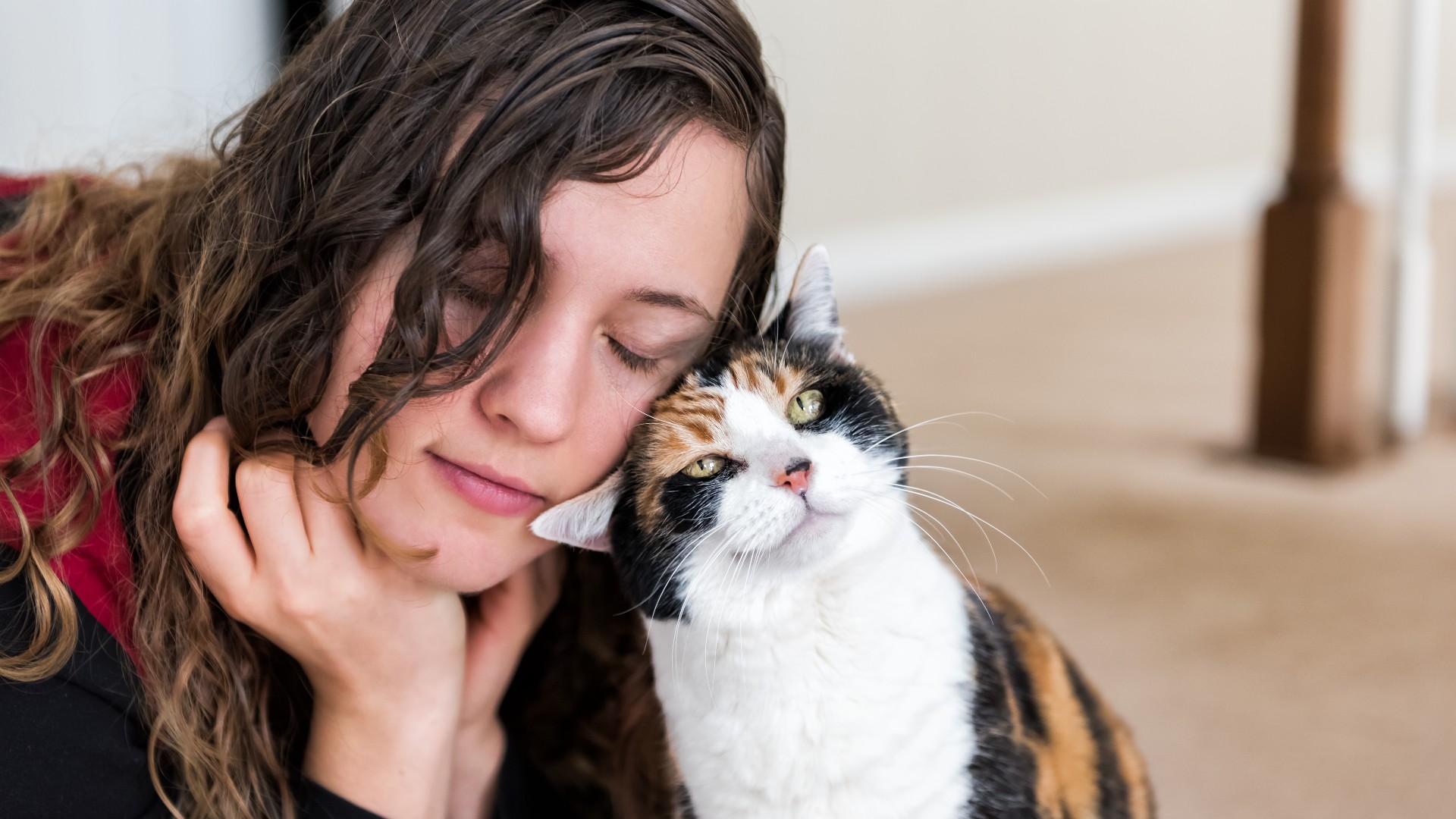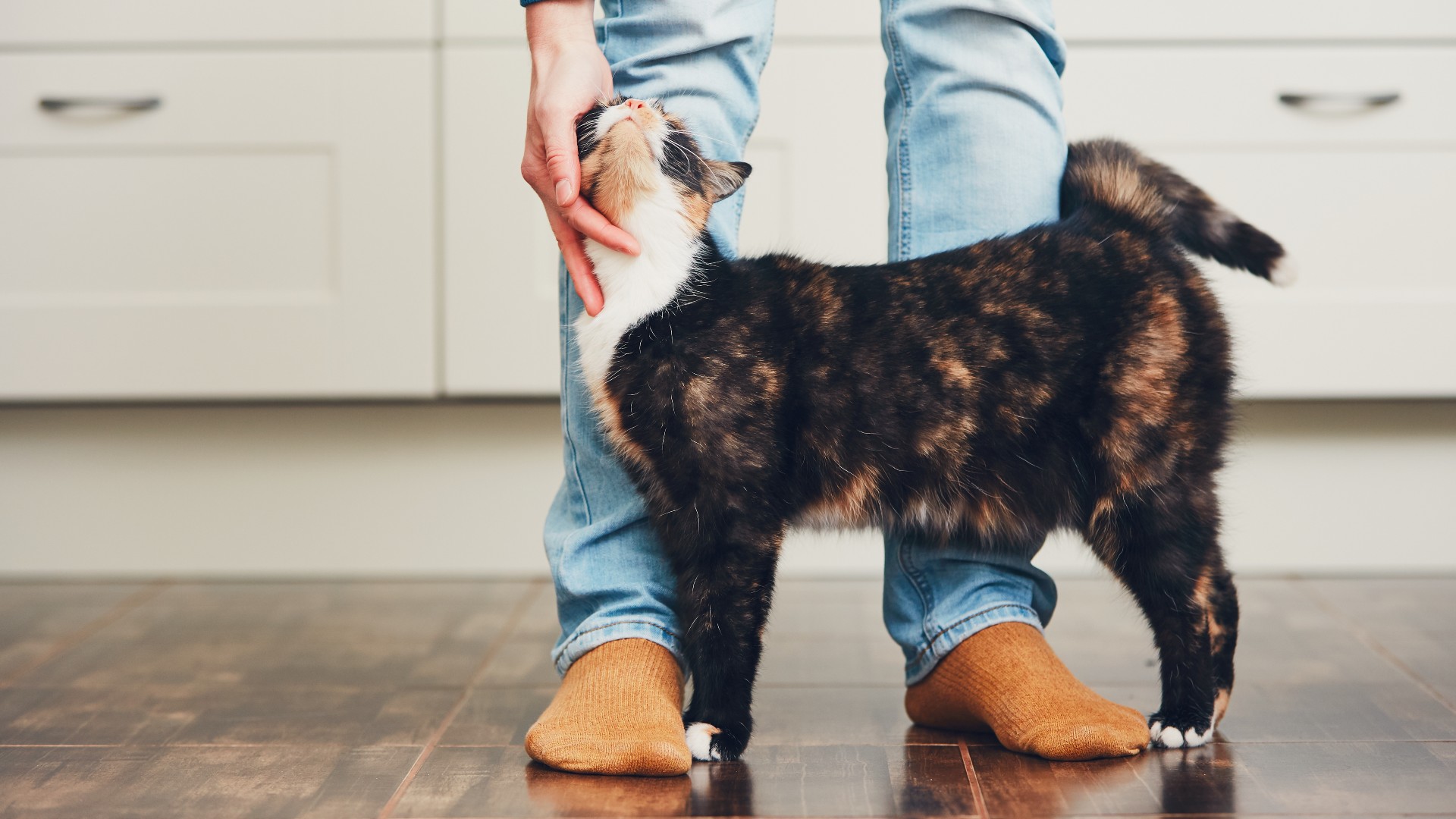Cat head butting: What is it and why do they do it?
Is your cat head butting you? From showing affection to claiming you as their own, we reveal the most common reasons behind this adorable behavior

If you have a feline friend in your life, cat head butting may be something you’ve been lucky enough to experience. Also known as head bunting, you’ll know you’ve been the recipient of this adorable and endearing behavior if your cat has bumped their head against you and then rubbed their cheek along whatever body part they’re closest to.
While it’s true that your kitty could be head butting you as a way of getting you to refill their bowl with more of the best cat food, more often than not, bumping you with their head is a way to create a colony scent and claim you as their own. It’s also a common way that cats show their affection for their humans and may also be used to help them to self-soothe.
It’s important to note that not all cats engage in head butting on a regular basis, so if your feline friend doesn’t bump you with their head, it’s not a cause for alarm. Just like we humans, all cats are different and head butting tends to be more often used by very confident and self-assured cats with shy furkids tending to use it less frequently.
Many cats rub against you as a way of showing their love and distributing their scent as opposed to head butting while highly affectionate lap cat breeds may prefer a good cuddle as opposed to a more forceful head butt. Rest assured that whatever way your cat chooses to connect is perfectly normal.
Read on to find out the most common reasons why cats head bunt. Plus, we reveal the differences between head butting and head pressing and why it's so important that you can distinguish between the two.
- What your cat's tail is telling you: Meanings, facts and its importance
- Why is my cat crying? Vet's guide to what it means and what to do
- Why do cats meow?
What is cat head butting?
A social bonding behavior that kittens first learn to use with each other, head butting is when a cat bumps their head against a person, fellow feline or object and then rubs their cheek against whatever it is they’re touching as a way of distributing their scent and creating what is known as a scent colony.
Cats have scent glands located on several points of their body, including their cheeks, forehead and tail. These scent glands contain what are known as pheromones, which are deposited during head butting and used as a form of scent communication.
Get the best advice, tips and top tech for your beloved Pets
Undetectable to humans, once your cat has head butted you, you’ve been marked with these pheromones, a sign to any other cats in the neighborhood that you’re taken.

Why do cats head butt?
Cat communication can be challenging to decipher and head butting is no different. Typically used for a range of bonding and social purposes, cat behaviorist Pam Johnson-Bennett says that your feline friend head butting you is usually a very positive sign.
“For the cat to place his face so close to yours and engage in this bonding behavior is quite an act of trust,” she says. While many people mistakenly assume that head butting is only about marking territory, Johnson-Bennett says it’s actually more complex than that.
“Cats use scent to mark their territory, yes, but they also do it to create comforting familiarity, show respect (ex: flank rubbing another cat), create a common colony scent (important for survival and cat colony harmony), self soothe, tell other cats about themselves and much more.”
To help you to understand the reasons why your cat may be head butting you, we outline five of the most common below.
1. To mark their territory
While it would be a mistake to think that marking their territory is the only reason cats head butt, it’s certainly one of them. If you have a cat scratching post or cat bed, you may notice your cat head butting it from time to time along with other furniture in your home.
This is their way of claiming what they consider to be their territory in a positive way (as opposed to urinating) and creating a safe space for themselves.
2. As a way of self-soothing
Cats love the smell of their own pheromones and you’ll often notice that cats knead and purr when they’re engaging in this behavior because it makes them feel happy and relaxed. Just like us humans, cats are prone to feeling stressed out or anxious from time to time and they’ll often use head butting as a way to help regulate their emotional state in order to feel calm again.
3. To seek attention
Cats can be crafty little creatures and if they know their head butting is going to be rewarded with a good scratch under the chin or pat on the head, then they’ll likely keep doing it. Alongside wanting to be petted, head butting may also be used when your feline friend has decided it’s dinner time or when they’re trying to get you to play with them.
4. As a form of affection
Cats use head butts to connect with people they consider theirs. Every time they bump you with their head, they’re marking you with more of their pheromones to make sure that every other cat in the neighborhood knows you belong to them.
So whenever your cat engages in this behavior with you, consider yourself very special indeed. Head bunting is the ultimate sign of affection and is your furkid's way of saying they love you.
5. To claim you as their own
As we’ve already seen, head butting is one of the primary methods of behavior a cat will use to claim you as their own. When your cat bumps their head against you, they’ve marked you and are communicating to you that they consider you a part of their inner circle.
Do all cats head butt?
Not all cats will head butt, so if your feline friend doesn’t engage in this behavior, there’s no cause for alarm. Head butting is often seen most frequently amongst confident and self assured cats, with shyer felines head butting less often or not at all.
The force of the head butt is also usually determined by a cat's personality, with extroverted and social kitty’s tending to be more forceful and reserved felines prone to being more gentle.
Cats show their love and affection in a variety of different ways, including curling up on your lap or beside you, purring, rubbing up against you, kneading, slow blinking or through cat chirping, a form of vocalization that signals contentment.
Head butting vs head pressing
As a pet parent, it’s important to know the difference between head butting and head pressing. While head pressing looks very similar at first glance to head butting it’s a very different behavior and is a sign that all is not well with your feline friend.
Head pressing is when a cat repeatedly and compulsively pushes their head into a wall or a piece of furniture. During this process you’ll notice that they appear agitated and may exhibit other abnormal behaviors, such as excessive vocalization, pacing, circling or disorientation.
If you notice that your cat is head pressing, it’s important you take them to the vet straight away as it’s often an indication of a neurological disorder.

Kathryn is a freelance writer who has been a member of the PetsRadar family since it launched in 2020. Highly experienced in her field, she's driven by a desire to provide pet parents with accurate, timely, and informative content that enables them to provide their fur friends with everything they need to thrive.
Kathryn works closely with vets and trainers to ensure all articles offer the most up-to-date information across a range of pet-related fields, from insights into health and behavior issues to tips on products and training.
When she’s not busy crafting the perfect sentence for her features, buying guides and news pieces, she can be found hanging out with her family (which includes one super sassy cat and a kitten), drinking copious amounts of Jasmine tea and reading all the books.
She has written for a range of publications, including Fit&Well, Top Ten Reviews, LiveScience, Goodto, and Product Hunt.
